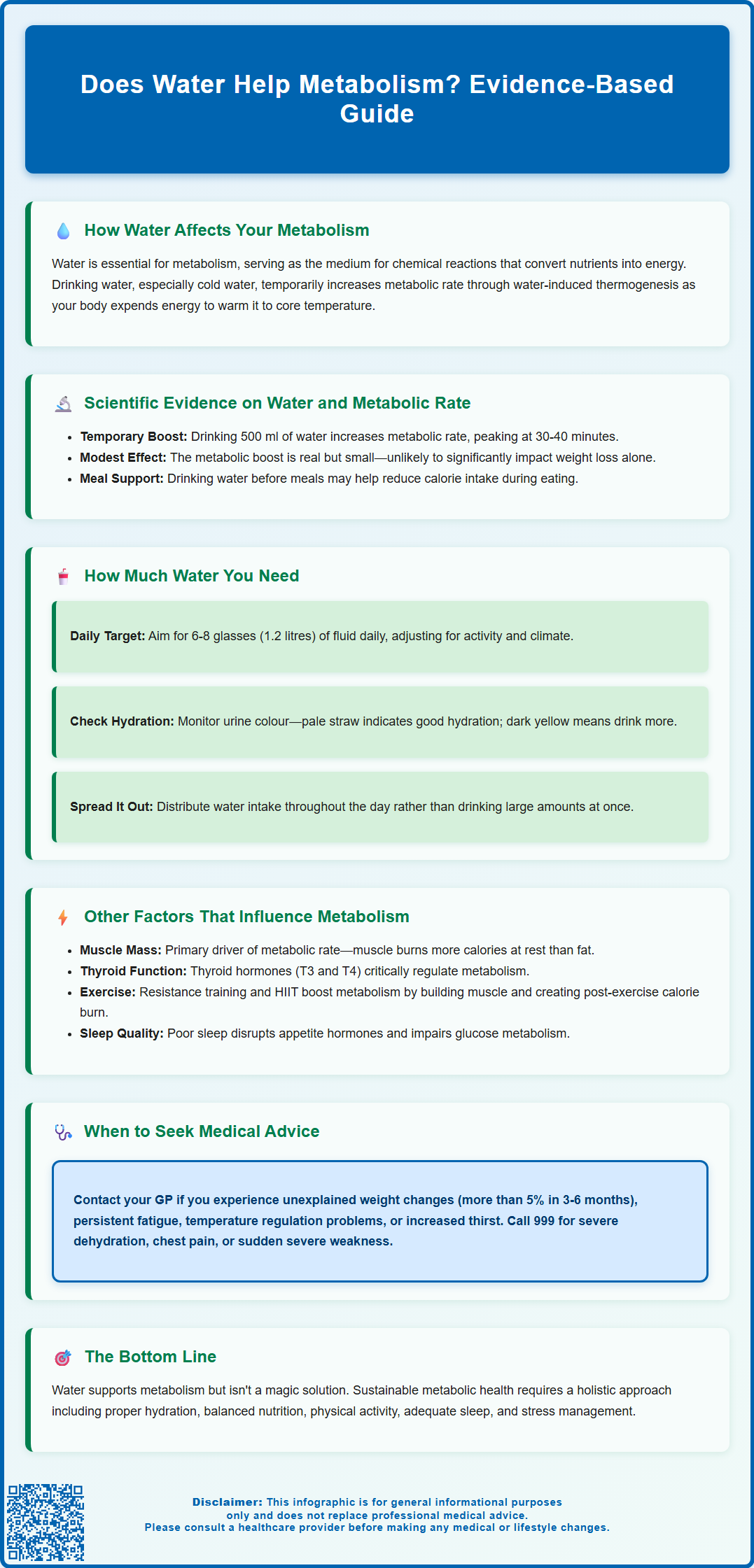Water is essential for metabolic health, serving as the medium in which virtually all biochemical reactions occur. Whilst adequate hydration supports normal metabolic processes, the question of whether water directly boosts metabolism has generated considerable interest. Research suggests that drinking water, particularly cold water, can temporarily increase metabolic rate through a process called water-induced thermogenesis. However, the magnitude of this effect is modest, and water should be viewed as one component of overall metabolic health rather than a standalone solution for weight management or metabolic disorders.
Summary: Water supports metabolic processes and can temporarily increase metabolic rate through thermogenesis, though the effect is modest and should not be relied upon as a standalone weight management strategy.
- Water facilitates nutrient transport, waste removal, and hydrolysis reactions essential for metabolism
- Drinking 500 ml of water can temporarily increase metabolic rate, peaking at 30-40 minutes post-consumption
- Cold water produces a greater thermogenic effect than room-temperature water, though the difference is small
- NHS recommends 6-8 glasses (approximately 1.2 litres) of fluid daily for adults, with individual needs varying
- Dehydration of 1-2% body mass can impair physiological functions including cognitive performance and exercise capacity
- Consult your GP for unexplained weight changes exceeding 5% of body weight within 3-6 months or persistent metabolic symptoms
Table of Contents
How Water Affects Your Metabolism
Water plays a fundamental role in virtually every metabolic process within the human body. Metabolism encompasses all chemical reactions that convert nutrients into energy and building blocks for cellular function, and water serves as the essential medium in which these reactions occur. At a cellular level, water facilitates the transport of nutrients, oxygen, and waste products, whilst also participating directly in hydrolysis reactions that break down macronutrients such as carbohydrates, proteins, and fats.
The concept of water-induced thermogenesis has gained attention in metabolic research. When you consume water, particularly cold water, your body expends energy to warm it to core body temperature. This process temporarily increases your metabolic rate, though the magnitude and clinical significance remain subjects of ongoing investigation. Additionally, adequate hydration supports optimal kidney function, enabling efficient filtration and excretion of metabolic waste products such as urea and creatinine.
Dehydration, even at mild levels (1-2% body mass loss), can impair various physiological functions. Research suggests that insufficient hydration may affect cognitive performance and exercise capacity. Proper hydration maintains blood volume and circulation, ensuring that oxygen and nutrients reach tissues efficiently, which supports normal metabolic processes.
It is important to note that whilst water supports metabolic processes, it is not a standalone solution for weight management or metabolic disorders. Water consumption should be viewed as one component of overall metabolic health, alongside balanced nutrition, physical activity, and adequate sleep.
Scientific Evidence on Water and Metabolic Rate
Research examining the relationship between water intake and metabolic rate has produced mixed but generally supportive findings. A frequently cited study published in the Journal of Clinical Endocrinology and Metabolism demonstrated that drinking 500 ml of water increased metabolic rate in healthy adults, with the effect peaking at 30-40 minutes post-consumption. The researchers suggested part of this increase was attributable to the energy required to heat the water to body temperature (thermogenesis).
However, subsequent studies have shown more modest effects, and the clinical significance for weight management remains debated. Systematic reviews examining water consumption and energy expenditure conclude that whilst water-induced thermogenesis does occur, the total additional energy expenditure is relatively small. The potential impact on weight management appears limited when considered in isolation, though it may contribute to a comprehensive approach to health.
Key considerations from the evidence base include:
-
Chilled water appears to produce a greater thermogenic effect than room-temperature water, though the difference is modest
-
The metabolic response may vary between individuals based on age, body composition, and baseline hydration status
-
Some studies suggest that pre-meal water consumption may modestly reduce subsequent caloric intake at meals
It is worth noting that there is no official link established between water consumption and treatment of metabolic disorders such as diabetes or thyroid dysfunction. Whilst adequate hydration supports overall metabolic health, water should not be considered a therapeutic intervention for diagnosed metabolic conditions without appropriate medical management.

How Much Water You Need for Optimal Metabolism
The NHS Eatwell Guide recommends that adults consume 6-8 glasses (approximately 1.2 litres) of fluid daily, though individual requirements vary considerably based on multiple factors. This guidance refers to drinks specifically, with additional water coming from food sources.
Factors influencing individual water requirements include:
-
Physical activity level: Exercise increases fluid losses through perspiration and respiration, requiring additional intake during and after activity
-
Environmental conditions: Hot or humid weather increases water losses, necessitating increased intake
-
Body composition: Individual variations in body size and composition affect fluid requirements
-
Medical conditions: Certain conditions (fever, diarrhoea, vomiting) or medications (diuretics) substantially increase fluid needs
A practical approach to assessing adequate hydration is monitoring urine colour—pale straw-coloured urine generally indicates appropriate hydration, whilst dark yellow or amber suggests insufficient intake. However, certain medications, vitamins (particularly B-complex), and foods can alter urine colour, potentially confounding this assessment.
For general health, consider distributing water intake throughout the day rather than consuming large volumes infrequently. Some evidence suggests that drinking water before meals may support healthy eating patterns by promoting satiety. However, excessive water consumption (beyond physiological needs) does not confer additional metabolic benefits and may, in rare cases, lead to hyponatraemia (low sodium levels).
Pregnant and breastfeeding women typically require additional fluids to support increased physiological demands and milk production. The British Dietetic Association recommends paying attention to thirst and ensuring urine remains pale in colour during these periods.
Other Factors That Influence Your Metabolism
Whilst adequate hydration supports metabolic function, numerous other factors exert substantially greater influence on metabolic rate. Understanding these variables provides important context for realistic expectations regarding water's metabolic effects.
Age and body composition represent primary determinants of basal metabolic rate. Muscle tissue is metabolically more active than fat tissue, requiring more energy at rest. Consequently, individuals with greater lean muscle mass maintain higher metabolic rates. Metabolic rate naturally changes with age, influenced by factors including progressive changes in muscle mass (sarcopenia) and hormonal fluctuations.
Thyroid function critically regulates metabolism through thyroid hormones (T3 and T4), which influence cellular energy processes. Thyroid disorders can significantly affect metabolic rate—hypothyroidism (underactive thyroid) can reduce it, whilst hyperthyroidism (overactive thyroid) can increase it. The NHS recommends thyroid function testing for individuals experiencing unexplained weight changes, fatigue, or temperature sensitivity.
Physical activity affects metabolism through both immediate energy expenditure and long-term adaptations. Regular resistance training increases muscle mass, thereby supporting resting metabolic rate. High-intensity interval training (HIIT) may produce excess post-exercise oxygen consumption (EPOC), temporarily elevating metabolic rate after exercise.
Dietary factors influence metabolic rate through several mechanisms:
-
Thermic effect of food: Protein requires more energy for digestion and metabolism compared to carbohydrates and fats
-
Meal frequency: Whilst previously thought to significantly affect metabolism, current evidence suggests total caloric intake matters more than meal timing or frequency
-
Severe caloric restriction: Prolonged energy deficit can trigger metabolic adaptations as a physiological response
Sleep quality and duration significantly impact metabolic health. Sleep deprivation disrupts hormones regulating appetite (leptin and ghrelin) and glucose metabolism, potentially affecting metabolic processes and insulin sensitivity.
When to Seek Medical Advice About Metabolism
Whilst variations in metabolic rate are normal, certain symptoms warrant medical evaluation to exclude underlying pathology. Contact your GP if you experience:
-
Unexplained weight changes: Gaining or losing more than 5% of body weight within 3-6 months without intentional dietary or activity changes may indicate metabolic, endocrine, or other medical conditions
-
Persistent fatigue: Overwhelming tiredness despite adequate sleep and rest, particularly when accompanied by cold intolerance, may suggest hypothyroidism or other metabolic disorders
-
Temperature regulation difficulties: Feeling persistently cold or experiencing heat intolerance, excessive sweating, or temperature fluctuations can indicate thyroid dysfunction
-
Changes in appetite or thirst: Marked increases in hunger or thirst, particularly with unexplained weight loss, may indicate diabetes mellitus
-
Cardiovascular symptoms: Palpitations, rapid heart rate, or chest discomfort alongside metabolic concerns require prompt evaluation
Your GP may arrange investigations including thyroid function tests (TSH, free T4), fasting glucose and HbA1c (for diabetes screening), full blood count (to exclude anaemia), and renal function tests. NICE guidelines recommend thyroid function testing for adults with symptoms suggestive of thyroid disease, unexplained weight changes, or relevant family history.
Seek urgent medical attention (call 999 or attend A&E) if you experience:
-
Severe dehydration symptoms: extreme thirst, very dark urine, dizziness, confusion, or reduced urine output
-
Chest pain or severe palpitations
-
Sudden, severe weakness or confusion
For non-emergency but urgent concerns, contact NHS 111 for advice.
For individuals with diagnosed metabolic conditions such as diabetes or thyroid disorders, maintaining regular follow-up appointments and medication adherence is essential. If you experience side effects from any medication, report them through the MHRA Yellow Card scheme (yellowcard.mhra.gov.uk). If you have concerns about your metabolism or weight management, your GP can provide personalised advice, arrange appropriate investigations, and refer you to specialist services such as endocrinology or dietetics if indicated. Remember that sustainable metabolic health requires a holistic approach encompassing hydration, nutrition, physical activity, sleep, and stress management rather than relying on any single intervention.
Frequently Asked Questions
Does drinking cold water boost metabolism more than warm water?
Cold water does produce a slightly greater thermogenic effect than room-temperature water because your body expends energy warming it to core temperature. However, the additional energy expenditure is modest and unlikely to significantly impact weight management on its own.
How much water should I drink daily for optimal metabolic health?
The NHS recommends 6-8 glasses (approximately 1.2 litres) of fluid daily for adults, though individual requirements vary based on physical activity, environmental conditions, body composition, and medical factors. Pale straw-coloured urine generally indicates adequate hydration.
When should I see a doctor about metabolism concerns?
Contact your GP if you experience unexplained weight changes exceeding 5% of body weight within 3-6 months, persistent fatigue despite adequate rest, temperature regulation difficulties, or marked changes in appetite or thirst. These symptoms may indicate thyroid dysfunction, diabetes, or other metabolic conditions requiring investigation.
The health-related content published on this site is based on credible scientific sources and is periodically reviewed to ensure accuracy and relevance. Although we aim to reflect the most current medical knowledge, the material is meant for general education and awareness only.
The information on this site is not a substitute for professional medical advice. For any health concerns, please speak with a qualified medical professional. By using this information, you acknowledge responsibility for any decisions made and understand we are not liable for any consequences that may result.
Heading 1
Heading 2
Heading 3
Heading 4
Heading 5
Heading 6
Lorem ipsum dolor sit amet, consectetur adipiscing elit, sed do eiusmod tempor incididunt ut labore et dolore magna aliqua. Ut enim ad minim veniam, quis nostrud exercitation ullamco laboris nisi ut aliquip ex ea commodo consequat. Duis aute irure dolor in reprehenderit in voluptate velit esse cillum dolore eu fugiat nulla pariatur.
Block quote
Ordered list
- Item 1
- Item 2
- Item 3
Unordered list
- Item A
- Item B
- Item C
Bold text
Emphasis
Superscript
Subscript












